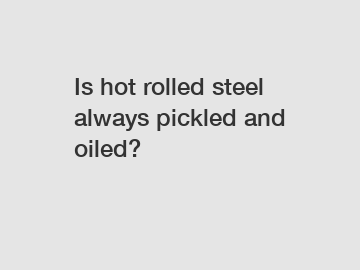Is hot rolled steel always pickled and oiled?
Hunter Special Steel Co., Ltd supply professional and honest service.
Hot rolled steel is a type of steel that undergoes a manufacturing process in which the steel is heated above its recrystallization temperature and then rolled into the desired shape or thickness. This process results in a finished product with a rough surface that may have imperfections and a layer of mill scale that needs to be removed. To achieve a smoother surface and protect the steel from rusting, it is common practice to pickle and oil hot rolled steel. However, the question remains, is hot rolled steel always pickled and oiled?
The Process of Pickling and Oiling Hot Rolled Steel.

Hot rolled steel is pickled and oiled to enhance its appearance and improve its overall quality. Pickling involves treating the steel with a solution that removes the mill scale and other impurities from the surface of the steel. This process results in a clean, smooth surface that is free from imperfections. After pickling, the steel is then oiled to protect it from corrosion and rust. The oil creates a barrier between the steel and the environment, preventing moisture from coming into contact with the steel and causing it to rust.
Benefits of Pickling and Oiling Hot Rolled Steel.
There are several benefits to pickling and oiling hot rolled steel. One of the main benefits is the improved appearance of the steel. Pickling removes the mill scale, leaving behind a clean, smooth surface that is more aesthetically pleasing. Additionally, the oil used in the process helps to protect the steel from rusting, extending its lifespan and reducing maintenance costs. Pickling and oiling also improve the weldability of the steel, making it easier to work with and reducing the risk of defects in the finished product.
Is Hot Rolled Steel Always Pickled and Oiled?
While pickling and oiling hot rolled steel is a common practice, it is not always necessary. Some applications may not require the steel to be pickled and oiled, particularly if the appearance of the steel is not a primary concern. In these cases, the steel may be used in its hot rolled state without undergoing the pickling and oiling process. However, if the steel is intended for applications where appearance, corrosion resistance, and weldability are important factors, pickling and oiling may be necessary.
When to Pickle and Oil Hot Rolled Steel.
The decision to pickle and oil hot rolled steel depends on the intended use of the steel. If a smooth, clean surface is required, or if the steel will be exposed to moisture and corrosive environments, pickling and oiling may be necessary. Additionally, if the steel will be welded or formed into complex shapes, pickling and oiling can improve the workability and quality of the finished product. It is important to consult with a steel supplier or manufacturer to determine the best treatment for hot rolled steel based on its intended application.
In conclusion, while pickling and oiling hot rolled steel is a common practice that offers several benefits, it is not always required. The decision to pickle and oil hot rolled steel depends on the specific requirements of the application. Whether pickling and oiling is necessary or not, it is essential to consider the intended use of the steel to ensure the best possible performance and quality. For more information on pickling and oiling hot rolled steel, feel free to contact us.
For more information, please visit our website.
For more galvanized steel coil suppliersinformation, please contact us. We will provide professional answers.
97
0
0


Comments
All Comments (0)